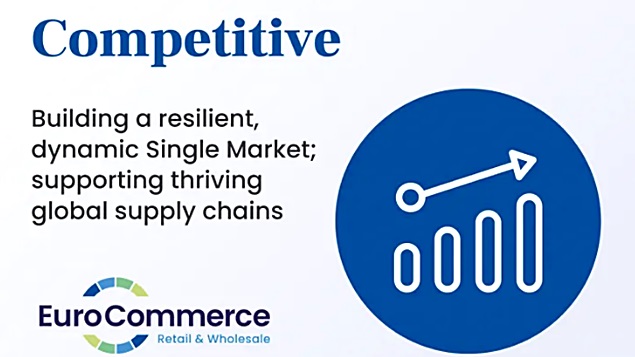1632

''We call on future EU institutions to work together with us to create the conditions for success and to transform the challenges we face into opportunities for a stronger, more competitive, and resilient Europe.
The Single Market is the cornerstone on which to build a stronger, competitive, and resilient Europe. It offers consumers more choices, innovation, and accessibility. It encourages the development of a retail and wholesale ecosystem with added value.
Retail and wholesale trade is recognized as a key sector with high potential for further integration into the Single Market, but it continues to face costly barriers that hinder our sector's competitiveness. Slow procedures for infringement of community law and political interference hold our sector back.
Retailers and wholesalers need a Single Market that works for all businesses and consumers, with policies that continue to facilitate trade globally, as our supply chains operate on a global scale.''
Consumers need support and stability
In the next mandate, retailers, wholesalers, and consumers need support and stability to navigate a rapidly changing environment.
For retailers and wholesalers to deliver transformation and invest, we need superior, practical, coherent legislation based on a solid understanding of our sector, avoiding unreasonable costs.
The volume of new legislation during the EU 2019-2024 mandate has been overwhelming and has significant and ongoing implications for retailers and wholesalers. Its effects are also keenly felt by SMEs and consumers and ultimately impact EU competitiveness.
We need to see a reduction in regulatory and reporting burdens, combined with increased support measures.
Key role in the transition to a circular economy
Retailers and wholesalers have a key role to play in the EU's journey to achieve carbon neutrality by 2050 and a circular economy. Reducing greenhouse gas emissions from scopes 1 and 2 by up to 90% by 2030 will require investments of up to EUR 300 billion, e.g., for renovating and modernizing stores and fleets, investing in renewable and energy-saving solutions for our sector, implementing electric charging infrastructure, and more.
There is also an urgent need to transition to more sustainable food systems to address current climate, environmental, societal, and economic challenges facing the agri-food ecosystem. This is what consumers expect, and our sector is committed to taking additional actions, together with supply chain partners.
Moving towards more circular systems will bring significant environmental, economic, and societal benefits, but it will also require investments of up to EUR 35 billion in circular infrastructure alone. Our sector is helping to reduce demand for virgin materials by finding new ways of sourcing and providing goods and services, including remanufacturing, repairing, reusing, and recycling.
We also recognize the huge potential of eco-design. For SME retailers and wholesalers, these initiatives present significant logistical and financial challenges.
At the same time, suppliers will be encouraged to use more durable materials. Equally important are the investments needed to encourage a shift in consumer mindset towards circularity in their purchasing choices.
Investments in IT
By 2030, it is estimated that 90% of retail and wholesale growth will be driven by online sales. Retailers and wholesalers are competing with tech companies, and to remain competitive, they will need to invest up to EUR 230 billion in IT and technology by the end of the decade. This is necessary for developing digital channels, automation, robotics, and cybersecurity.
The digitalization of SMEs is particularly important, and finding ways to enable them to use digital tools should be a priority.
A channel-neutral approach will be essential to ensure that existing rules are consistently applied. We will need support and guidance to protect online fairness and improve compliance with consumer protection requirements.
The largest EU employer
Retailers and wholesalers are the largest private employer in the EU and must train half of their 26 million employees each year. Between now and 2030, the sector will need to invest up to EUR 35 billion in upskilling and reskilling. Only SMEs will need to double their investments in skills. This is essential to support the sector's future.
Developing a skilled and competitive workforce goes hand in hand with supporting vibrant and dynamic villages, towns, and city centers. The pandemic has caused many people to leave their jobs, and stores and city centers have closed.
The loss of retail has a broad impact on individuals, communities, and the economy as a whole, threatening the EU's way of life. Demographic changes are also a huge challenge, as we have an aging population, while fewer young people are entering the workforce. (Photo: Eurocommerce)





